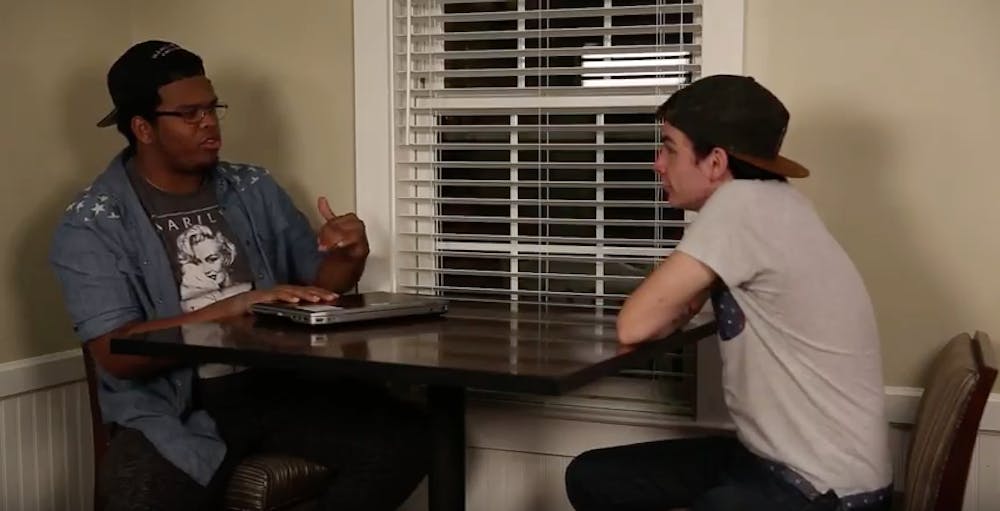The past year saw changes and advocacy for gender equality and acceptance, a topic largely hidden from the public dialogue until now. With public figure Bruce Jenner making her transition into Caitlyn and Blake Lively and Ryan Reynolds provoking the conversations of gender-neutral names by naming their daughter James, gender is becoming more of a hot topic.
At Elon University, students, using their classwork and campus resources, have brought a great deal of visibility to the forefront of equality, with a prime example being “Luctus: A Teen Drama,” a YouTube show created by senior Valerie Reich and junior Darius Moore.
The show was written so that the main characters were scripted using gender-neutral names like Charlie, Noa, Alex, Jamie and Riley. The creators felt this was a way to build the characters’ true selves, allowing them to develop as people regardless of their gender. These unisex names do not strike a masculine or feminine connotation.
Reich said she and Moore went into writing the script with the same idea that “people are people,” and by assigning non-gender specific names they were able to look at the characters without preconceived notions of how they should or should not act based on their gender.
“Luctus” is filmed on campus with juniors George Whitaker and Fergie Philippe-Auguste and seniors Caleb Albert, Monica Poston and Kelsey McCabe as the main characters. The pilot of the show, the only episode out, centers around on the lives of these five students at fictional Luctus University.
To create the first episode, the cast spent a while developing their characters and becoming comfortable with one another.
“We spent a few days on set, which was unusual for me since I’m used to sets only being four hours,” McCabe said. “This extra time really helped us become familiar with our characters and build relationships with the other cast and crew members.”
Reich said the main goal going into the pilot was to make it as dramatic as possible. This whole episode is filled with relationship and friend drama to make the plot relatable to students.
“There’s a scene I have with George Whitaker, talking about mixed vibes from crushes that we’ve all felt,” McCabe said. “The fact that George’s character felt the same way made me connect with the gender neutrality concept. Anyone, regardless of gender, can go through the relationships and issues we face in this show.”
Historically, gender has been the basis on which societal structures are formed. With this new gender-neutral naming, some social structures are straying away from the norm and are allowing gender to be a less significant feature of a person. This is something that “Luctus” creators were aiming for — to have characters whose names did not have to conform to restrictive stereotypes.
Though this trend of neutral naming seems to be a new movement, Michael Giordano, a psychotherapist and licensed clinical social worker from Washington, D.C., who specializes in gender identity, calls it a newer cultural phenomenon and suspects it’s been around for a long time, but has been kept very quiet and private.
The gender-neutral trend can give people a kind of non-restrictive independence that gendered names do not.
Giordano thinks the idea of “Luctus” is fascinating and original.
“I haven’t heard of anything like it,” he said. “I suspect it would be of comfort to gender-neutral people who feel alone as well.”
Helping to eliminate these preconceived notions about who a person is and what he or she stands for is something the show’s creator Reich wanted to bring to the forefront. This story line opens up dialog in so many other areas — the idea of gender-neutral naming is the first step to reassuring people to have the courage to be true to themselves.
“Subcultures should maintain their own individual cultural identity, but overall we should strive to become a more inclusive human population,” Reich said.
Giordano agrees that in the face of a judging culture, belief in oneself is something to be admired.
Focusing on her goals of equality, Reich is hoping her story “Luctus” will open doors for gender-neutral people, to help others understand the challenges and help gender-neutral people not feel so alone.
As of now, a second episode has not been shot.
“This was one of my favorite projects I’ve worked on at Elon and it ends on such a cliffhanger,” McCabe said. “I hope we get to continue working on this project.”


